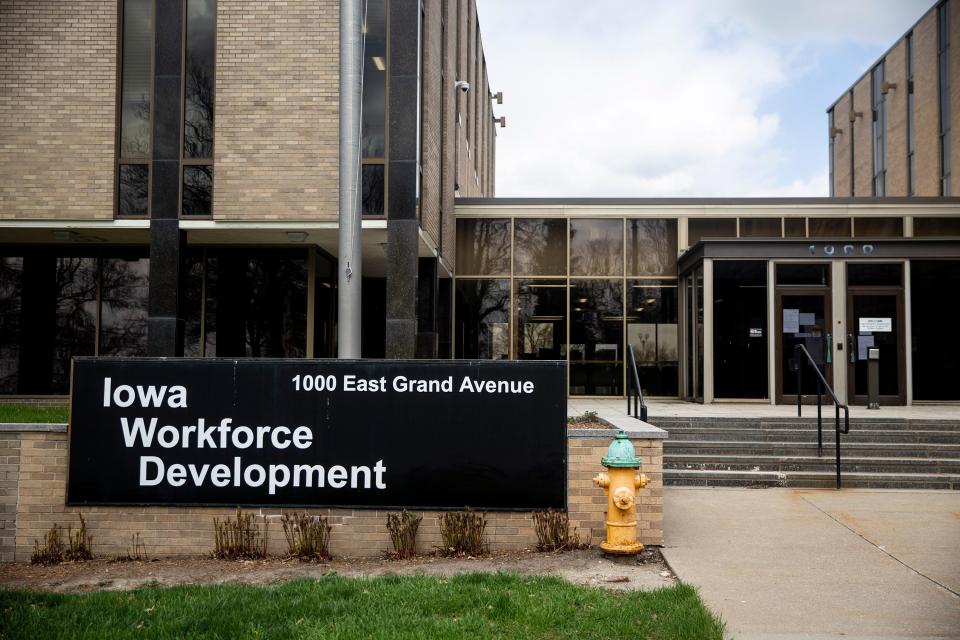Prisoners, dead people receive Iowa unemployment, audit finds
The state of Iowa dished out $238,000 in unemployment compensation to people who were either incarcerated or dead, according to a new report.
Iowa Workforce Development issued the payments because agency officials were not using or checking systems designed to detect fraud, according to the review State Auditor Rob Sand released Tuesday. The annual report examined practices by the agency during the fiscal year that ended in June 2020, about three months into the COVID-19 pandemic.
Perhaps more than any other government agency, Iowa Workforce Development was inundated during those months as hundreds of thousands of workers lost their jobs amid shutdowns ordered while the deadly virus began to sweep through the state. During a 15-week period beginning that March, 365,000 people filed unemployment claims with the state. That's more than the 285,000 claims that the state received in all of the previous two years.
Amid that crunch, the state did not run claims through a computer system to check whether applicants' personal information matched those of inmates, according to the audit. Among other reasons, an inmate is ineligible for unemployment because a federal law requires that a recipient be "available for work."
Iowa Workforce Development spokesperson Jesse Dougherty said in an email that agency employees stopped performing the cross match in the early days of the pandemic. Those employees processed unemployment claims and worked in customer service instead. The agency resumed checking inmate information in February 2021.
Agency investigators realized that eight claimants from the prior fiscal year had received benefits despite being in jail or prison, receiving about $113,000 from the state.

The report also found that Iowa Workforce Development employees during the pandemic's first months did not detect six claimants who used the Social Security numbers of dead people, receiving about $125,000. The state typically checks information from claimants against data provided by the U.S. Social Security Administration, including a list of Social Security numbers for dead people.
According to the report, many investigators dropped the task as Iowa Workforce Development reassigned workers to process new claims and respond to questions from workers.
In a response to the audit, an unnamed Iowa Workforce Development official wrote that the U.S. Department of Labor told state agencies to prioritize getting payments to workers above other functions. Iowa Workforce Development increased the number of workers in its unemployment insurance division to about 475 from 140. The agency reported that it received about 25,000 customer service calls a day during the period, up from about 1,000 calls a day before the pandemic.
"Moving all resources to processing claims and providing customer service ensured we were paying all eligible claimants in the quickest time possible as we were directed to do and in line with our priorities," the official wrote in the response.
The agency said investigators are checking Social Security information again. The agency also receives information about deceased people from the Iowa Department of Public Health, according to the report.
Iowa Workforce Development said in a statement that the U.S. Department of Labor accepted its explanations for the questioned expenses.
The audit did not specify whether the state recovered any of the $238,000 it paid. Overall, Iowa paid about $460 million out of its unemployment trust fund from March through June 2020, according to its account with the U.S. Treasury Department.
The labor department's Office of Inspector General concluded earlier this year that states improperly paid out about $163 billion in unemployment benefits during the pandemic, most of it the result of fraud.
Andrew Stettner, a policy analyst at the Century Foundation, previously told the Des Moines Register that Iowa was likely not a target for widescale fraud, given how much more easily a criminal could hide fake claims amid a much larger stack of cases in more populous states like California or New York.
Ottumwa couple indicted for tax, unemployment fraud
Also Tuesday, the U.S. Attorney's Office for the Southern District of Iowa announced that a federal grand jury had indicted an Iowa father and daughter on 60 counts last week, including charges that they had defrauded Iowa Workforce Development.
According to a news release, 47-year-old Thein Maung and 20-year-old Phyo Mi prepared and filed hundreds of fraudulent federal tax returns in Ottumwa. Maung and Mi allegedly put false information on the returns, reporting to the federal government that clients should receive inflated returns because of federal energy credits or business expense deductions that they weren't actually eligible for.
The father and daughter directed that some of the claimed refunds be deposited into bank accounts they operated, setting them up to receive about $140,000 from the federal government, according to the news release.
Maung and Mi also filed unemployment insurance claims on behalf of some customers, the U.S. Attorney's Office said. According to the release, the filings directed Iowa Workforce Development to send $70,000 in benefits to Maung and Mi's bank accounts.
The grand jury indicted each of them on one count of conspiracy to defraud the United States and 14 counts of wire fraud. The grand jury also indicted Maung on 30 counts of preparing and presenting a false tax return and five counts of willful failure to file return. Mi faces 10 counts of preparing and presenting a false tax return.
According to the release, the father and daughter, if convicted, each face up to 20 years in prison.
Tyler Jett covers jobs and the economy for the Des Moines Register. Reach him at tjett@registermedia.com, 515-284-8215, or on Twitter at @LetsJett.
This article originally appeared on Des Moines Register: Audit: Iowa unemployment payments went to inmates, dead people

